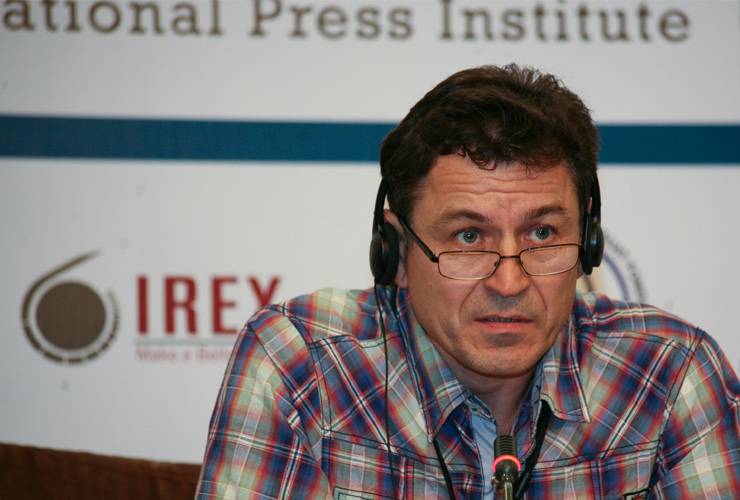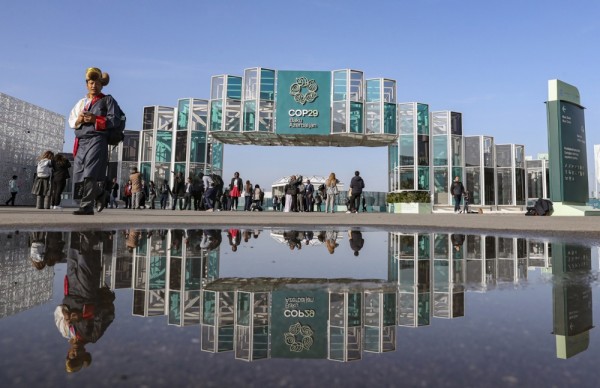The International Press Institute (IPI) today called on Russian authorities to bring to justice those responsible for yesterday’s assault on well-known investigative journalist Grigory Pasko, who was attacked while in the city of Barnaul in Russia’s Altai region to train local journalists.
Pasko, director of the Community of Investigative Journalists – Fond 19/29, said that two large, muscular men wearing dark sunglasses attacked him in the street of the southern Siberian city, knocking him to the ground and shouting: “Get out of our city! We are going to get you!”
He reported the attack to local police and was examined by a doctor. Despite reportedly suffering a concussion and significant bruising of his face, Pasko later in the day resumed training local journalists in investigative techniques.
Yesterday’s attack was the latest in a series of incidents that began when Pasko arrived in Barnaul on Sunday and an unknown man followed him to his hotel. Shortly before the training was set to start at the hotel conference hall, he said, two police officers arrived and started checking the passports of journalists present for the training and recording their information.
Pasko wrote on Facebook that the officers indicated that they were present to “spot illegal migrants”, but that he and other Fond 19/29 trainers “have never had such checks before”.
The attack also reportedly followed harassment online and in local social media. The Barnaul edition of nationalist website Monavista published a story labelling Pasko a “foreign agent” and “traitor”, threatening him with retaliation.
Russian journalist and former IPI Executive Board Chair Galina Sidorova – Pasko’s colleague and a co-founder of Fond 19/29 – said the group assessed the situation following the attack on Pasko and opted to continue the training if local journalists dared to come to the seminar, which, she said, they did.
However, she commented: “The open assault in Barnaul shows that we are now facing the new level of harassment and hate that the Russian regime practices towards critically minded journalists, civil activists and even independently thinking citizens who express their views openly.”
IPI Director of Advocacy and Communications Steven M. Ellis called yesterday’s attack “a sad reflection of the intolerance for independent journalism in Russia today”. He said IPI urged authorities “to identify Mr. Pasko’s attackers and bring them to justice, because the failure to do so sends a clear signal encouraging future attacks”.
Ellis also called for “an end to harassment of individuals for exercising the fundamental human rights to express themselves and to share and receive information”.
Pasko is a former officer of the Russian Navy who worked as an investigative journalist for the Russian Pacific Fleet’s newspaper. He was arrested in 1997 and accused of espionage after exposing the Russian Navy’s dumping of nuclear waste in the Sea of Japan. Initially found not guilty, he was later given three years in prison for “abuse of his official position”.
On appeal, the Court of the Pacific Fleet sentenced Pasko to four years of hard labour for treason. Amnesty International recognised him as a prisoner of conscience, saying the prosecution was “motivated by political reprisal” and in 2003 Pasko was released after serving two thirds of his sentence.
The training Pasko was giving in Barnaul is part of a program that Fond 19/29 has conducted in Russia’s regions since 2011 and was organised in partnership with local media house Altaipress.
Sidorova said that the program has experienced years of harassment.
“We started this training program in the regions as the ‘Russian Foundation for Investigative Journalism – Foundation 19/29’,” she said. “But authorities considered our training of journalists to be ‘political activity’ funded by foreign grants and under recent legislation we had to register as an ‘NGO–foreign agent’. When we refused to do so, the foundation was liquidated by the court decision.
“We registered our organisation in Prague in 2015 with a similar name, ‘Community of Investigative Journalists – Fond 19/29’, but we still live and work in Russia. We know that the secret service follows us. When we last did training in Perm, the local journalists union refused to partner with us at the last moment, telling us openly that they were advised not to do so by some ‘influential local bosses’. We also were bullied in local social media and some journalist participants of the seminar were approached by secret service guys with the same ‘advice’.”



